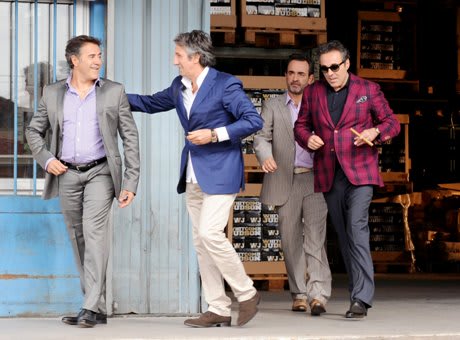The most likely explanation for how lackadaisically abysmal the third entry in the Would I Lie To You series comes across is that everyone involved simply thought showing up and bantering with each other would suffice. A stark indication of how some French humor just does not translate overseas and with a running time of almost two hours, it doesn't even have the decency to be brief in its rambling indulgences.
The plot-- in as much as there is one-- finds the group of five friends and family members facing a crisis at their clothing store, resulting in an audit and the immediate need for a large sum of cash. The fact that this takes an hour to establish, while one character falls in love with the taxwoman and another convinces his delusional step-father that he is his dead brother to bilk some money out of him, says a lot about some of the causes of the tedium.
Things cohere enough in the second half for a straightforward con job involving buying some sneakers manufactured in China to resolve the mess. This business deal can't be completed, of course, without some more painfully unfunny hijinks at a dinner and then a karaoke bar. As if this wasn't interminable enough, the ending is padded with a lengthy epilogue that insists on continuing the characters' stories long after things have already wrapped themselves up.
What is evidently lost on North American audiences is the notion that the mere mention of anything Jewish is considered funny, as the religion has been extensively mined for laughs in previous installments of this trilogy. The real mystery is how they have managed to keep audiences hungry for more of these movies when a few of the main characters feel almost interchangeable, without any of the defining characteristics you would expect from having already appeared in two other films.
Serge (José Garcia) remains the most fully formed and amusing of the bunch, if only because it's easy to wring comedy from a fool who continuously finds new ways to screw things up. But even his finest moments are overshadowed by what almost seems to be an outright refusal to commit to any actual storylines beyond the tangential.
It's rare and unfortunate when a movie can't improve upon its own title sequence, so it should obviously be considered the most backhanded of compliments to say that the best part of this movie was probably the credits.
(Vertigo)The plot-- in as much as there is one-- finds the group of five friends and family members facing a crisis at their clothing store, resulting in an audit and the immediate need for a large sum of cash. The fact that this takes an hour to establish, while one character falls in love with the taxwoman and another convinces his delusional step-father that he is his dead brother to bilk some money out of him, says a lot about some of the causes of the tedium.
Things cohere enough in the second half for a straightforward con job involving buying some sneakers manufactured in China to resolve the mess. This business deal can't be completed, of course, without some more painfully unfunny hijinks at a dinner and then a karaoke bar. As if this wasn't interminable enough, the ending is padded with a lengthy epilogue that insists on continuing the characters' stories long after things have already wrapped themselves up.
What is evidently lost on North American audiences is the notion that the mere mention of anything Jewish is considered funny, as the religion has been extensively mined for laughs in previous installments of this trilogy. The real mystery is how they have managed to keep audiences hungry for more of these movies when a few of the main characters feel almost interchangeable, without any of the defining characteristics you would expect from having already appeared in two other films.
Serge (José Garcia) remains the most fully formed and amusing of the bunch, if only because it's easy to wring comedy from a fool who continuously finds new ways to screw things up. But even his finest moments are overshadowed by what almost seems to be an outright refusal to commit to any actual storylines beyond the tangential.
It's rare and unfortunate when a movie can't improve upon its own title sequence, so it should obviously be considered the most backhanded of compliments to say that the best part of this movie was probably the credits.
